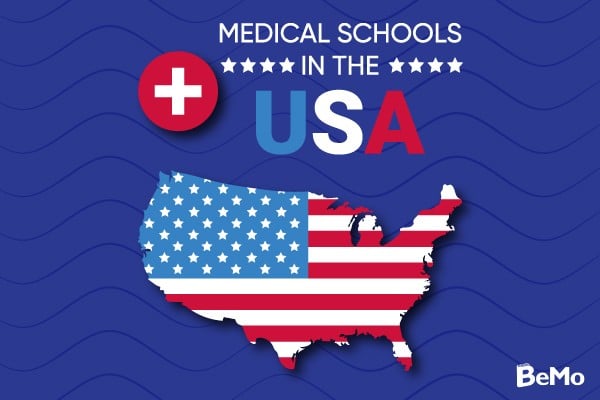There are 154 medical schools in the US offering an MD program, along with 41 DO or osteopathic medical programs. If you’re wondering how to get into medical school in the US, the first step is to familiarize yourself with this list of schools. We’ve compiled a list of all medical schools in the US, including allopathic and osteopathic schools. We also discuss some important considerations to keep in mind when making a decision about which schools to apply to.
Disclaimer: although we have made every effort to provide the most accurate information, admissions information changes frequently. Therefore, we encourage you to verify these details with the official university admissions office. You are responsible for your own results. BeMo does not endorse nor affiliate with any official universities, colleges, or test administrators and vice versa. If you see an error here, please notify us with the updated information, and we’ll send you a FREE copy of a BeMo ebook of your choosing! You can receive our Ultimate Guide to Med School Admissions, our Ultimate Guide to MMI Prep, our Ultimate Guide to Medical School Personal Statements & Secondary Essays or our Ultimate Guide to CASPer Prep! Please email us at content [at] bemoacademicconsulting.com with any corrections, and we’ll arrange to send you your free ebook upon confirming the information.
>>Want us to help you get accepted? Schedule a free initial consultation here <<
List of all Medical Schools in the US
The following tabs list all the medical schools in the US, arranged alphabetically, by state. We also indicate, in brackets, which application system the medical school uses (AMCAS, AACOMAS or TMDSAS).
Use the arrows to view more tabs.
Alabama
University of Alabama School of Medicine (AMCAS)
- GPA: 3.85
- Acceptance Rate: 3.96%
- Message from the school for BeMo's Blog Visitors: Coming soon! Check back later.
- Every student receives one hour complimentary consultation with BeMo: Available
University of South Alabama College of Medicine (AMCAS)
- GPA: 3.9
- Acceptance Rate: 4.33%
- Message from the school for BeMo's Blog Visitors: Coming soon! Check back later.
- Every student receives one hour complimentary consultation with BeMo: Coming soon! Check back later.
Alabama College of Osteopathic Medicine (AACOMAS)
- GPA: 3.47
- Acceptance Rate: --
- Message from the school for BeMo's Blog Visitors: Coming soon! Check back later.
- Every student receives one hour complimentary consultation with BeMo: Coming soon! Check back later.
Edward Via College of Osteopathic Medicine – Auburn (AACOMAS)
- GPA: --
- Acceptance Rate: --
- Message from the school for BeMo's Blog Visitors: Coming soon! Check back later.
- Every student receives one hour complimentary consultation with BeMo: Coming soon! Check back later.
Arizona
University of Arizona College of Medicine – Tucson (AMCAS)
- GPA: 3.84
- Acceptance Rate: 1.62%
- Message from the school for BeMo's Blog Visitors: Coming soon! Check back later.
- Every student receives one hour complimentary consultation with BeMo: Coming soon! Check back later.
The University of Arizona College of Medicine Phoenix (AMCAS)
- GPA: 3.88
- Acceptance Rate: 1.89%
- Message from the school for BeMo's Blog Visitors: Coming soon! Check back later.
- Every student receives one hour complimentary consultation with BeMo: Coming soon! Check back later.
Arizona College of Osteopathic Medicine of Midwestern University (AACOMAS)
- GPA: 3.53
- Acceptance Rate: 25%
- Message from the school for BeMo's Blog Visitors: Coming soon! Check back later.
- Every student receives one hour complimentary consultation with BeMo: Coming soon! Check back later.
A.T. Still University - School of Osteopathic Medicine in Arizona (AACOMAS)
- GPA: 3.45
- Acceptance Rate: 5.3%
- Message from the school for BeMo's Blog Visitors: Coming soon! Check back later.
- Every student receives one hour complimentary consultation with BeMo: Coming soon! Check back later.
Arkansas
UAMS College of Medicine (AMCAS)
- GPA: 3.87
- Acceptance Rate: 6.75%
- Message from the school for BeMo's Blog Visitors: Coming soon! Check back later.
- Every student receives one hour complimentary consultation with BeMo: Coming soon! Check back later.
Alice L Walton School of Medicine (AMCAS)
- GPA: 3.4 minimum
- Acceptance Rate: N/A
- Message from the school for BeMo's Blog Visitors: Coming soon! Check back later.
- Every student receives one hour complimentary consultation with BeMo: Coming soon! Check back later.
Arkansas College of Osteopathic Medicine (AACOMAS)
- GPA:
- Acceptance Rate:
- Message from the school for BeMo's Blog Visitors: Coming soon! Check back later.
- Every student receives one hour complimentary consultation with BeMo: Coming soon! Check back later.
FAQs
1. How do I apply to medical schools in the US?
If you want to apply to medical schools in the US, you need to submit your application in one of the following ways:
- AACOMAS: For osteopathic medical schools
- TMDSAS: For medical schools in Texas
- AMCAS: For allopathic medical schools in the US
- Other: Some schools have their own application process that does not utilize any of the above portals.
You will need to check the admissions website of the medical schools you’re applying to so you can confirm their specific application processes and medical school requirements.
2. How do I decide which medical schools to apply to?
“I did not focus on actual acceptance rates as they are all low ... I focused more on my priorities and matching my applicant profile to the school’s profile … Beyond that I looked at opportunities for research support, patient population diversity, and locations where students matched. I also thought about where rotations occur during third year as I wanted to focus on hospitals where rotations were not scattered and centralized to a main hospital center.” – Dr. Monica Taneja, MD
“I applied to both [MD and DO] because I wanted a diverse range of different programs. I applied to a number of schools that were in range of my stats … Of the acceptance offers I received, I believed that the DO school I went to offered the most comprehensive education. It was the best in terms of match rate, 1sttime board pass rate, and had a good reputation in securing students the rotations they wanted.” – Dr. Tony Huynh, DO
3. Which medical school is easiest to get into USA?
While there are some schools that are considered the easiest medical schools to get into, such as DO schools and schools with higher-than-average acceptance rates, no medical school is “easy” to get accepted into.
Dr. Taneja advises use MSAR as a resource when building a list of schools to apply to:
“MSAR was a great resource as I built a list. I utilized the GPA and MCAT ranges to make sure my statistics were within the 25-75 percentiles. I also noted the number of volunteer, work, and research experiences that accepted applicants had and focused on schools that had averages that matched my numbers.”
4. How hard is it get into medical school in US?
The short answer is: it is difficult to get into medical school, but not impossible!
Take it from one of our students, Rishi, who was a successful reapplicant to medical school:
“Sometimes it does feel like medical school admissions is a little bit random and there's no kind of rhyme or reason to why certain people get in and why other people don't and you know there is a little bit of this randomness to it and but you know at the end of the day you can't let yourself get too stressed out about the parts you can’t control. What you should focus on is on that there are things you can do that are established that will help you get into good places and help you get into more places so focus on the part you can control … being diligent, intentional and proactive throughout the whole process will make a huge difference.” – Rishi, former BeMo student
5. Do medical schools in the US give preference to in-state applicants?
The answer to this question depends on the school or program in question. Generally speaking, Ivy League medical schools and elite private schools treat all applications equally irrespective of the location of the applicant, while public or state schools usually give preference to in-state applicants. For instance, Texas medical schools heavily favor in-state applications. A lot of state schools also charge higher tuition for out-of-state applicants.
6. Can international students apply to medical schools in the US?
Yes, there are many medical schools that accept international students in the US. However, there are some that do not consider international applicants at all. Some may only permit Canadian applicants but no others. You should check the admissions policies on the university website to confirm the specific policy for each school.
7. How to get into medical school in the US?
To get into medical school in the US, you need to complete all the medical school requirements for the programs you’re applying to and submit your application via the appropriate portal as per the applicable medical school application timelines. Common med school admissions requirements include the following: good GPA and MCAT score, completion of medical school prerequisites, excellent letters of recommendation, impressive medical school personal statements, meaningful extracurriculars, etc.
“Don’t rush and prioritize. The requirements for medical school are all tough! Don’t overload yourself on classes trying to knock out requirements as you don’t want to be spread too thin. Try and spread out requirements over the 3-4 years of undergrad so that you can do your best in each class … MCAT and GPA are important as screening tools … However, the other pieces of your application are what differentiate you from a crowd and will ultimately be why a school chooses to accept you.” – Dr. Monica Taneja, MD.
You may also have to complete medical school interviews and finish additional application components such as the Altus Suite. For both, effective preparation is key:
“For me, preparation meant having a solid grasp of the interview format (i.e., being comfortable with timing and the different types of questions such as acting, collaborating, and writing stations), researching the medical school (and understanding their curriculum, mission statement, and extra-curricular activities they offered), reflecting on my life experiences and extracting lessons applicable to a medical career as well as ensuring I was well informed about current issues … aided me in making a more substantial first and lasting impression!” – Dr. Shaughnelene Smith, DO
“[When preparing for CASPer or MMI] I believe nothing beats practice. By going through the questions and timing oneself rigidly, time management and prioritization become more apparent for students.” – Dr. Tony Huynh, DO.
8. Can a Canadian got to medical schools in the US?
Yes! Many US medical schools accept Canadian applicants, and some even allow Canadians to apply as “out-of-state” applicants. These are called Canadian-friendly medical schools. Applying to US medical schools can open up more possibilities for an acceptance, like it did for our admissions expert, Dr. Smith, DO:

